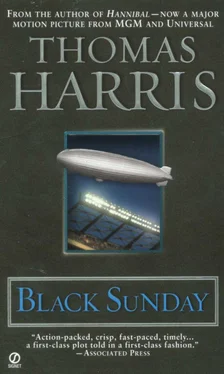Fasil came into the workshop as Lander was attaching the outside cover, a sheet of fiberglass the same thickness as the skin of the nacelle.
Lander did not speak to him.
Fasil appeared to pay little attention to the object on the workbench, but he recognized what it was, and he was ap palled. The Arab looked around the workshop for several minutes, careful not to touch anything. A technician himself, trained in Germany and North Vietnam, Fasil could not help admiring the neatness and economy with which the big nacelle was constructed.
“This material is hard to weld,” he said, tapping the Reynolds alloy tubing. “I see no heliarc equipment. Did you farm out the work?”
“I borrowed some equipment from the company over the weekend.”
“The frame is stress-relieved as well. Now that, Mr. Lander, is a conceit.” Fasil intended this as a joking compliment to Lander’s craftsmanship. He had decided his duty lay in getting along with the American.
“If the frame warped and cracked the fiberglass shell, someone might see the darts as we rolled it out of the truck,” Lander said in a monotone.
“I thought you would be packing in the plastic by now, with only a month remaining.”
“Not ready yet. I have to test something first.”
“Perhaps I can be of assistance.”
“Do you know the explosive index of this material?”
Fasil shook his head ruefully. “It’s very new.”
“Have you ever seen any of it detonated?”
“No. I was instructed that it is more potent than C-4. You saw what it did to Muzi’s apartment.”
“I saw a hole in the wall and I can’t tell enough from that. The most common mistake in making an antipersonnel device is putting the shrapnel too close to the charge, so the shrapnel loses its integrity in the explosion. Think about that, Fasil. If you don’t know it you should know it. Read this field manual and you will find out all about it. I’ll translate the big words for you. I don’t want these darts fragmented in the blast. I am not interested in merely filling seventy-five institutes for the deaf. I don’t know how much buffer is necessary between the darts and the plastic to protect them.”
“But look at how much is in a claymore-type device—”
“That’s no indication. I’m dealing with longer ranges and infinitely more explosive. Nobody has ever built one this big before. A claymore is the size of a schoolbook. This is the size of a lifeboat.”
“How will the nacelle be positioned when it is detonated?”
“Over the fifty-yard line at precisely one hundred feet altitude, lined up lengthwise with the field. You can see how the curve of the nacelle conforms to the curve of the stadium.”
“So—”
“So, Fasil, I have to also be sure that the darts will disperse in the correct arc, rather than blowing out in big lumps. I’ve got some leeway inside the skin. I can exaggerate the curves if I have to. I’ll find out about the buffer and about the dispersal when we detonate this,” Lander said, patting the device on his workbench.
“It’s got at least a half kilo of plastic in it.”
“Yes.”
“You can’t set it off without drawing the authorities.”
“Yes, I can.”
“You would have no time to examine the results before the authorities came.”
“Yes, I will.”
“This is—” He nearly said “madness,” but stopped himself in time. “This is very rash.”
“Don’t worry about it, A-rab.”
“May I check your calculations?” Fasil hoped he could devise a way to stop the experiment.
“Help yourself. Remember, this is not a scale model of the side of the nacelle. It just contains the two compound curves used in dispersing the shrapnel.”
“I’ll remember, Mr. Lander.”
Fasil spoke privately with Dahlia as she was carrying out the trash. “Talk to him,” he said in Arabic. “We know the thing will work as it is. This business of the test is not an acceptable risk. He will lose everything.”
“It might not work perfectly,” she replied in English. “It must be without flaw.”
“It does not have to be that perfect.”
“For him, it does. For me, too.”
“For the purpose of the mission, for what we set out to do, it will work adequately the way it is.”
“Comrade Fasil, pushing the button in that gondola on January twelfth will be the last act of Michael Lander’s life. He won’t see what comes after. Neither will I, if he needs me to fly with him. We have to know what’s coming after, do you understand that?”
“I understand that you are beginning to sound more like him than like a front-fighter.”
“Then you are of limited intelligence.”
“In Lebanon I would kill you for that.”
“We’re a long way from Lebanon, Comrade Fasil. If either of us ever sees Lebanon again, you may try at your convenience.”
RACHEL BAUMAN, M.D., SAT BEHINDa desk at Halfway House in the South Bronx, waiting. The addict rehabilitation center held many memories for her. She looked around the bright little room with its amateurish paint job and pickup furniture and thought about some of the ravaged, desperate minds she had tried to reach, the things that she had listened to, in her volunteer work here. It was because of the memories the room evoked that she had chosen this place to meet with Eddie Stiles.
There was a light rap on the door and Stiles came in, a slight, balding man looking around with quick glances. He had shaved for the occasion. A patch of tissue was stuck to a nick on his jaw. Stiles smiled awkwardly and fiddled with his cap.
“Sit down, Eddie. You’re looking well.”
“Never better, Dr. Bauman.”
“How’s the tugboat business?”
“To tell you the truth, dull. But I like it. I like it, understand,” he added quickly. “You done me a good turn getting me that job.”
“I didn’t get you that job, Eddie. I just asked the man to look you over.”
“Yeah, well, I’d never have got it otherwise. How’s with you? You look kind of different, I mean like you feel good. What am I talking? You’re the doctor.” He laughed self-consciously.
Rachel could see that he had gained weight. When she met him three years ago, he had just been arrested for smuggling cigarettes up from Norfolk in a forty-foot trawler, trying to feed a seventy-five dollars a day heroin habit. Eddie had spent many months at Halfway House, many hours talking to Rachel. She had worked with him when he was screaming.
“What did you want to see me about, Dr. Bauman? I mean, I’m glad to see you and all and if you was wondering if I’m clean—”
“I know you’re clean, Eddie. I want to ask you for some advice.” She had never before presumed on a professional relationship, and it disturbed her to do so now. Stiles noted this instantly. His native wariness warred with the respect and warmth he felt for her.
“It’s got nothing to do with you,” she said. “Let me lay it out for you and see what you think.”
Stiles relaxed a little. He was not being asked to commit himself about anything immediately.
“I need to find a boat, Eddie. A certain boat. A funny-business boat.”
His face revealed nothing. “I told you I would tugboat and that’s all I do is tugboat, you know that.”
“I know that. But you know a lot of people, Eddie. I don’t know any people who carry on funny business in boats. I need your help.”
“We level with each other, always have, right?”
“Yes.”
“You never blabbed none of the stuff I told you when I was on the couch, right?”
“Nope.”
“Okay, you tell me the question and who wants to know.”
Rachel hesitated. The truth was the truth. Nothing else would do. She told him.
Читать дальше












